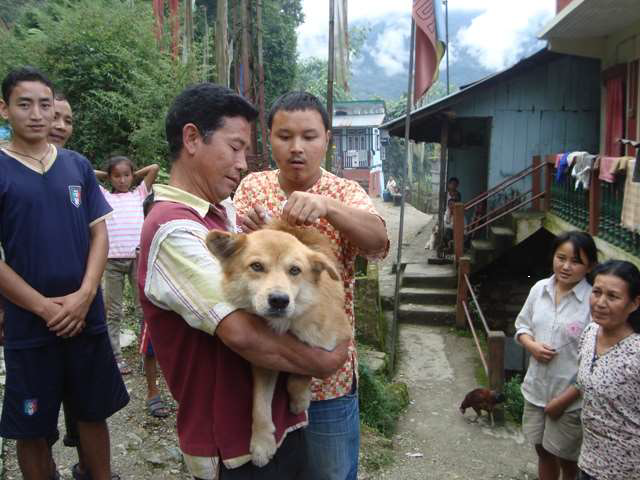Veterinary leader strives for a rabies-free state in the Himalayas
- Community News
- Dog vaccination
To share what inspires those involved in the effort to eradicate rabies, we are taking a closer look at the work and the lives of some of the winners of the World Rabies Day MSD Animal Health Award from 2016.

Motivated by a strong desire to improve animal welfare and public health, Dr. Thinlay N. Bhutia has spent his career working towards a rabies-free state in his Himalayan home of Sikkim, India. Bordered by Bhutan and Nepal, this mountainous region has been the first state in India nearly to attain this goal, an achievement spearheaded by Dr. Bhutia’s strength in leadership and his tireless advocacy for humane dog population management and rabies vaccination of both canines and wildlife.
Dr. Bhutia began his remarkable career as a state veterinary officer in India, but saw a unique opportunity for championing rabies control as the program coordinator of the first government-sanctioned, state-wide program–the Sikkim Anti-Rabies and Animal Health (SARAH) Division. This program advocates for the humane treatment of animals, while focusing on sterilization, rabies vaccination, and community education as control measures.
Dr. Bhutia’s high regard for the compassionate care of animals has always been a driving force for his work. He notes, “I feel strongly that improving animal welfare is an important part of a veterinarian’s role.” And these values have manifested in many aspects of the SARAH program’s efforts as he has worked to change societal attitudes towards the treatment of dogs.
At the inception of the SARAH program, Dr. Bhutia helped end the mass shooting of stray dogs, a common, but ineffective practice employed for rabies control. Working with Vets Beyond Borders, sterilization–a more humane approach for managing dog populations–became the norm. In addition, seeing that attitudes in the community were negatively affected by problem dogs, Dr. Bhutia has been successful in driving the message that when dogs are treated in a humane way, then they are less likely to bite. Through community education programs, Dr. Bhutia has been able to maintain the no-cull policy, which was often challenged when new problems surfaced with aggressive dogs.
Collaborating closely with Vets Beyond Borders, Dr. Bhutia and the SARAH program implemented the first state-wide mass vaccination program in India in 2010, an effort which continues annually and will have a lasting impact on difficult-to reach, stray dog populations. One nominator for Dr. Bhutia’s MSD award described the program’s impressive successes, noting, “There has been an overwhelming positive impact since the inception of SARAH…there is now a small, manageable street dog population in Sikkim and fewer stray dog puppies in distress. There is less fighting of stray dogs particularly in breeding season, and the majority is healthy and friendly.” With these efforts, the state of Sikkim has been free of canine rabies since 2010 and almost free of human rabies deaths since 2006, and with only two unconfirmed human cases arising in 2016.
Dr. Bhutia’s leadership in rabies control has not been limited to typical veterinarian duties. To achieve the goal of a rabies-free state, Dr. Bhutia has been involved in a broad range of leadership activities and has been committed to the One Health approach, recommending rabies-control actions for the government and for the medical community alike and providing guidance for clinical protocols and the collection of epidemiological data, as well as making significant contributions to animal care after natural disasters and to controlling rabies in wildlife populations. Dr. Bhutia’s determined efforts in the fight against rabies have culminated with the initiation of legislation necessary to declare Sikkim a rabies-free state, potentially placing Sikkim as the first state in India to reach this goal.
By Laura Baker, GARC, summarized from materials submitted with Thinlay N. Bhutia’s nomination for a World Rabies Day MSD Animal Health Award. You can read more about the achievements of the SARAH program here.
